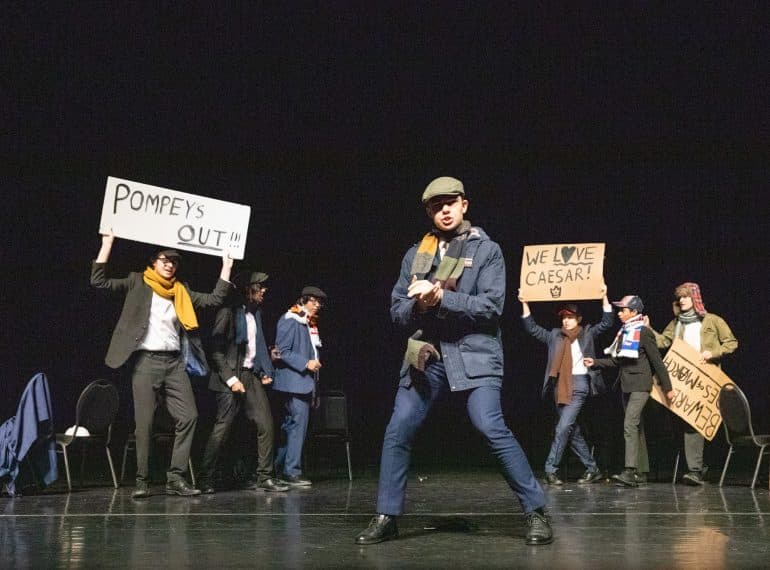
QE actors mixed the language of Shakespeare with modern costumes and props to create a potent performance for our times.
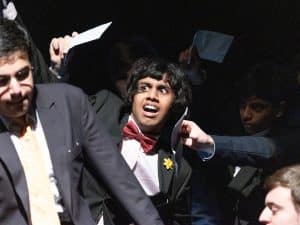 The boys put on Julius Caesar at North Finchley’s artsdepot in the Shakespeare Schools Festival and then twice in School to Years 9 and 11 as part of QE’s inaugural Shakespeare and Latin Festival.
The boys put on Julius Caesar at North Finchley’s artsdepot in the Shakespeare Schools Festival and then twice in School to Years 9 and 11 as part of QE’s inaugural Shakespeare and Latin Festival.
In his review of the play, Head of English Robbie Hyland said: “This was one of the strongest productions Queen Elizabeth’s has staged in recent years, not only due to the strong individual performances, but particularly due to the strength of ensemble performances.
“Julius Caesar is, among other things, a play about the relationships between leaders and their citizens – our production, featuring most cast members on stage most of the time, clearly demonstrated how impactful one voice can be on the many.”
First performed in 1599, Julius Caesar centres on the assassination of the eponymous Roman dictator in 44BC. In Shakespeare’s telling, Roman general Brutus joins a conspiracy led by the politician, Cassius, to assassinate Caesar, ostensibly to prevent him from becoming a tyrant. Caesar’s right-hand man Antony stirs up hostility against the conspirators, and Rome falls into civil war.
The play contains many often-quoted lines, including:
- Yond Cassius has a lean and hungry look: He thinks too much: such men are dangerous
- This was the most unkindest cut of all
- Friends, Romans, countrymen, lend me your ears.
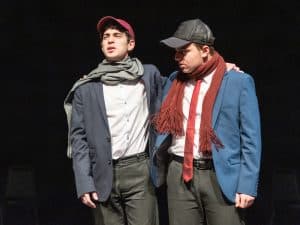 “Many congratulations should go to the whole cast and crew, as the actors allowed some of Shakespeare’s most famous lines to shine – from Mark Antony and Brutus’ soaring funeral orations to Caesar’s resigned acceptance of his fate,” said Mr Hyland.
“Many congratulations should go to the whole cast and crew, as the actors allowed some of Shakespeare’s most famous lines to shine – from Mark Antony and Brutus’ soaring funeral orations to Caesar’s resigned acceptance of his fate,” said Mr Hyland.
The director, Gavin Lister, of Rough Magicke Drama, explained in his notes for the production that he originally considered a Godfather-style setting for the play, with the characters as mafiosi. But following the “extraordinary turn after extraordinary turn” in UK politics over recent months, it became “impossible to ignore the modern-day political turbulence and the parallel themes explored in the classical piece we had been given the gift to perform.
“That is not to say our production is specific to Britain. It is not. The unstable political situations over the course of our rehearsal period in Italy, Brazil, China and Iran have provided us with a social background in which the themes of the play can be seen playing out very much in present-day real life.” These he enumerated as “the dangers of autocracy, the clandestine bargaining that takes place in corridors of power, the brutal and clinical nature of conspiracy, and the effectiveness or ineffectiveness of the people’s voice”.
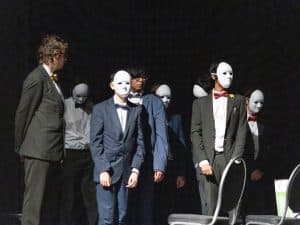 “The students have embraced the themes and the concept, and they have provided more pieces of inspired drama and theatricality than I could have hoped for. For that, and for their general work ethic and insatiable enthusiasm, I thank them,” Mr Lister added.
“The students have embraced the themes and the concept, and they have provided more pieces of inspired drama and theatricality than I could have hoped for. For that, and for their general work ethic and insatiable enthusiasm, I thank them,” Mr Lister added.
Drama has undergone a resurgence at QE in recent years, and the School is currently raising funds to create The Robert Dudley Studio – a facility devoted to drama and the spoken word.
Many of the cast spoke of how much they enjoyed taking part in the production.
Year 11 pupil Saim Khan, in the title role, said: “Playing the hardened political genius that is Julius Caesar was a very different experience to previous roles that I’ve done and a great opportunity to try something completely new.”
Year 10’s Simi Bloom, who played Flavius, a Roman tribune (a representative elected by the people), said: “Learning how to incorporate the modern world into a centuries-old story has been really fun and interesting, especially drawing parallels between prominent figures or systems of today and those of the Roman Empire.”
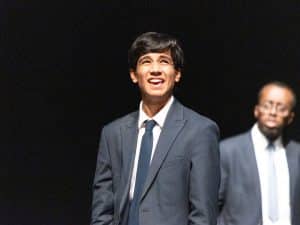 Year 11 actor Uday Dash said: “I had to adapt and build Cassius into a manipulative, calculating character, which was both a challenge and a unique experience.”
Year 11 actor Uday Dash said: “I had to adapt and build Cassius into a manipulative, calculating character, which was both a challenge and a unique experience.”
Riann Mehta, of Year 12, who played Caesar’s wife, Calpurnia, said: “It has been extremely pleasant to explore a female character by stepping out of gendered expectations. Embracing feminine stereotypes has been a major development in my theatrical presentation and has been a vastly entertaining experience.”
The play was one of the highlights of the Shakespeare and Latin Festival.
The festival programme also included a very well attended lecture on Decadence in New York and Ancient Rome for senior Latinists and English Literature GCSE and A-level students given by Dr Emily Pillinger, Senior Lecturer in Latin Language and Literature at King’s College London and a talk from UCL Professor of Latin Gesine Manuwald, who explored the real-life characters of Julius Caesar, Mark Anthony and Cicero.
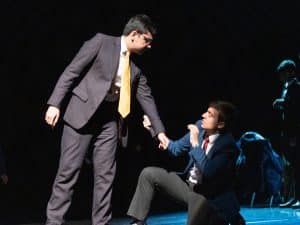 Assistant Head (Pupil Involvement) Crispin Bonham-Carter said: “Dr Pillinger drew out the links between Baz Luhrmann’s film of The Great Gatsby, Fitzgerald’s novel and the ancient Latin text, The Feast of Trimalchio.”
Assistant Head (Pupil Involvement) Crispin Bonham-Carter said: “Dr Pillinger drew out the links between Baz Luhrmann’s film of The Great Gatsby, Fitzgerald’s novel and the ancient Latin text, The Feast of Trimalchio.”
“Both academics were hugely impressed by how engaged and knowledgeable our young classicists are.”
The festival was one of a number being held at QE allowing teachers and boys to take time to celebrate a subject beyond the classroom. “Our staff are passionate advocates for the broader-world impact of their disciplines,” said Mr Bonham-Carter.
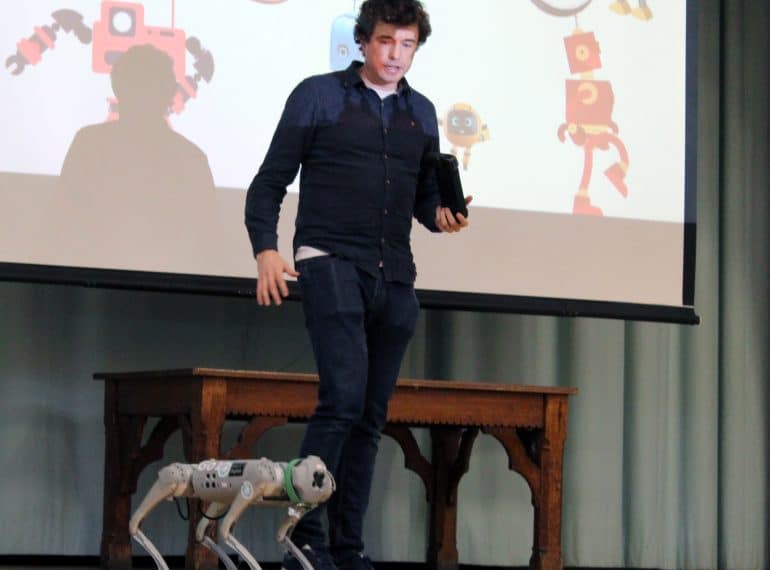
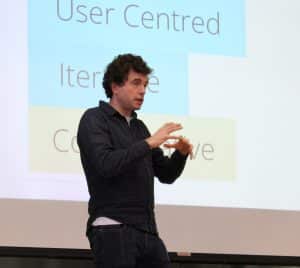 Mr Greig, who works for Deloitte Digital (part of the global Deloitte financial services and consultancy group) as its Chief Disruptor, made it through the snow to give a lunchtime lecture about his work, which involves working with new technologies to understand how they can benefit clients.
Mr Greig, who works for Deloitte Digital (part of the global Deloitte financial services and consultancy group) as its Chief Disruptor, made it through the snow to give a lunchtime lecture about his work, which involves working with new technologies to understand how they can benefit clients.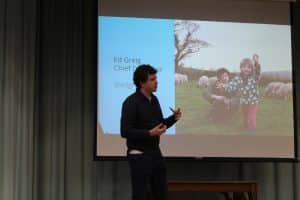 He gave the real-life example of a prosthetic arm for a six-year-old girl, where the issue was not merely the functionality of the limb, but making sure the girl would actually wear it by ensuring its design was fashionable and appealing, so that she would want to put it on.
He gave the real-life example of a prosthetic arm for a six-year-old girl, where the issue was not merely the functionality of the limb, but making sure the girl would actually wear it by ensuring its design was fashionable and appealing, so that she would want to put it on.
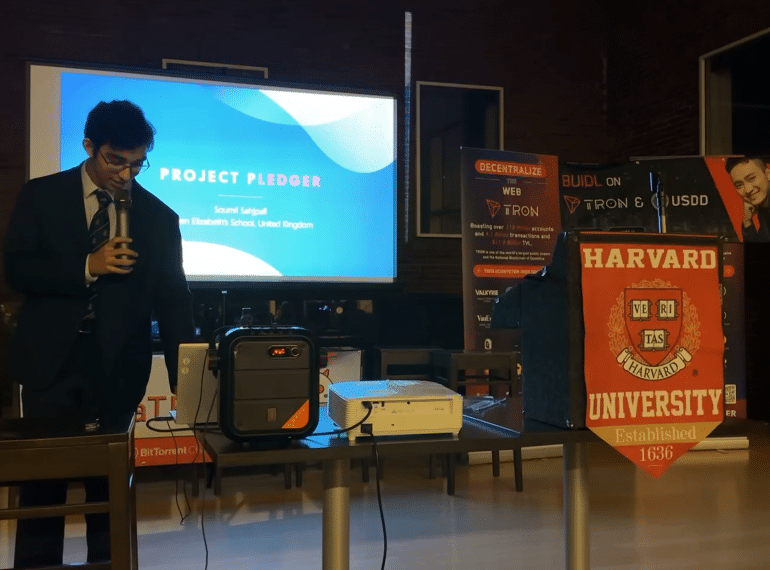
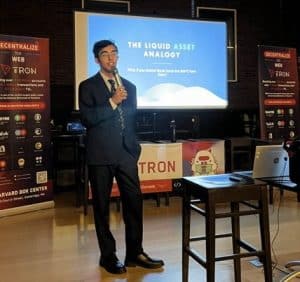 During his trip to the US, Soumil rubbed shoulders with Ivy League students as he developed blockchain software for cryptocurrency TRON in a coding marathon. His app earned him an ‘honourable mention’ from the judges, who placed him in joint-ninth place out of 55 teams.
During his trip to the US, Soumil rubbed shoulders with Ivy League students as he developed blockchain software for cryptocurrency TRON in a coding marathon. His app earned him an ‘honourable mention’ from the judges, who placed him in joint-ninth place out of 55 teams.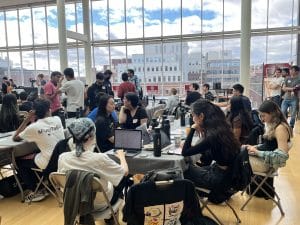 TRON, a leading cryptocurrency with a current market value of $5 billion, set a brief to develop a dAPP, or “decentralized app” – that is, software that runs on the blockchain, as opposed to on a server hosted by technology giants such as Amazon or Microsoft.
TRON, a leading cryptocurrency with a current market value of $5 billion, set a brief to develop a dAPP, or “decentralized app” – that is, software that runs on the blockchain, as opposed to on a server hosted by technology giants such as Amazon or Microsoft.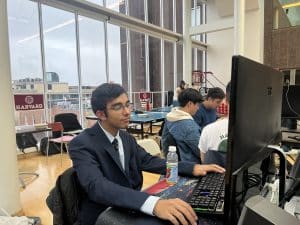 “I found out about this hackathon with relatively short notice, so I competed solo,” he said. “I was relatively confident in my abilities and knew I’d still be having lots of fun, so that was all right. The average team size was around four members – with a maximum of five – so I was at a disadvantage.”
“I found out about this hackathon with relatively short notice, so I competed solo,” he said. “I was relatively confident in my abilities and knew I’d still be having lots of fun, so that was all right. The average team size was around four members – with a maximum of five – so I was at a disadvantage.”
 The boys put on Julius Caesar at North Finchley’s artsdepot in the Shakespeare Schools Festival and then twice in School to Years 9 and 11 as part of QE’s inaugural Shakespeare and Latin Festival.
The boys put on Julius Caesar at North Finchley’s artsdepot in the Shakespeare Schools Festival and then twice in School to Years 9 and 11 as part of QE’s inaugural Shakespeare and Latin Festival. “Many congratulations should go to the whole cast and crew, as the actors allowed some of Shakespeare’s most famous lines to shine – from Mark Antony and Brutus’ soaring funeral orations to Caesar’s resigned acceptance of his fate,” said Mr Hyland.
“Many congratulations should go to the whole cast and crew, as the actors allowed some of Shakespeare’s most famous lines to shine – from Mark Antony and Brutus’ soaring funeral orations to Caesar’s resigned acceptance of his fate,” said Mr Hyland. “The students have embraced the themes and the concept, and they have provided more pieces of inspired drama and theatricality than I could have hoped for. For that, and for their general work ethic and insatiable enthusiasm, I thank them,” Mr Lister added.
“The students have embraced the themes and the concept, and they have provided more pieces of inspired drama and theatricality than I could have hoped for. For that, and for their general work ethic and insatiable enthusiasm, I thank them,” Mr Lister added. Year 11 actor Uday Dash said: “I had to adapt and build Cassius into a manipulative, calculating character, which was both a challenge and a unique experience.”
Year 11 actor Uday Dash said: “I had to adapt and build Cassius into a manipulative, calculating character, which was both a challenge and a unique experience.” Assistant Head (Pupil Involvement) Crispin Bonham-Carter said: “Dr Pillinger drew out the links between Baz Luhrmann’s film of The Great Gatsby, Fitzgerald’s novel and the ancient Latin text, The Feast of Trimalchio.”
Assistant Head (Pupil Involvement) Crispin Bonham-Carter said: “Dr Pillinger drew out the links between Baz Luhrmann’s film of The Great Gatsby, Fitzgerald’s novel and the ancient Latin text, The Feast of Trimalchio.”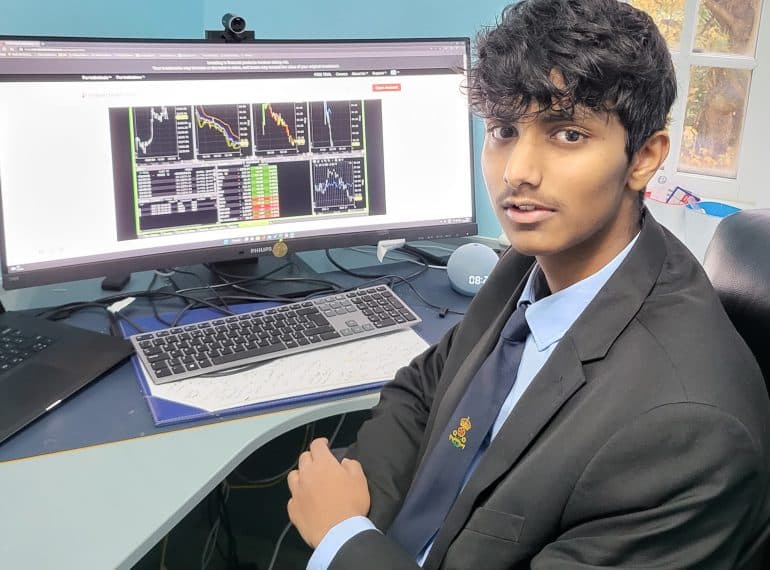
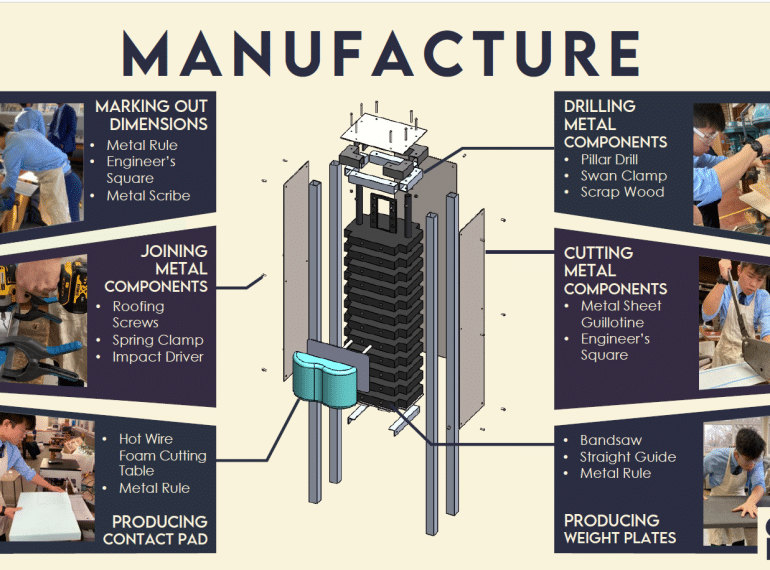
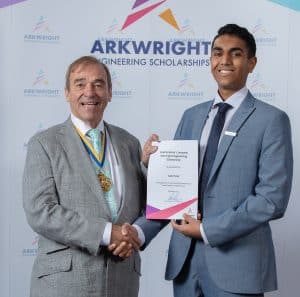 Darren Lee and Yash Patel laboured for months through a gruelling selection process for the scholarships, which will now provide them with financial and mentoring support during their A-level studies.
Darren Lee and Yash Patel laboured for months through a gruelling selection process for the scholarships, which will now provide them with financial and mentoring support during their A-level studies.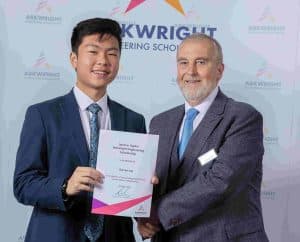 The process included an engineering aptitude test and an online interview, during which candidates had both to make a presentation and to respond to technical engineering questions.
The process included an engineering aptitude test and an online interview, during which candidates had both to make a presentation and to respond to technical engineering questions.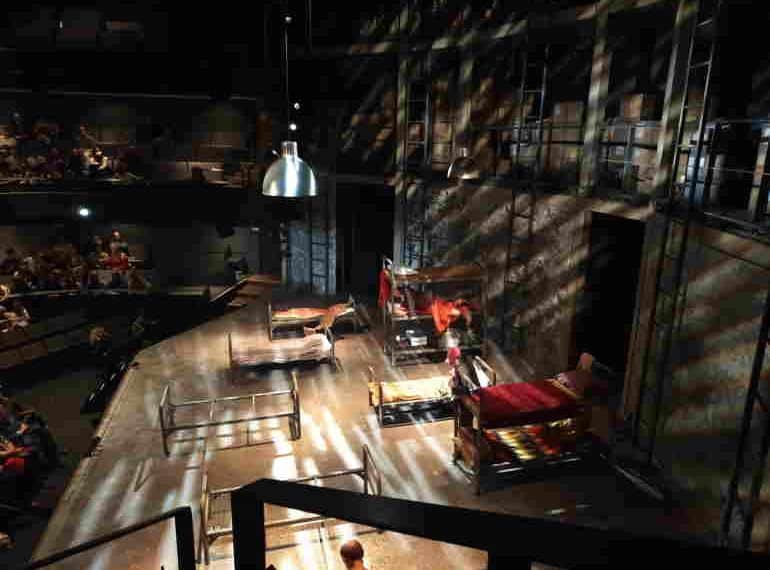
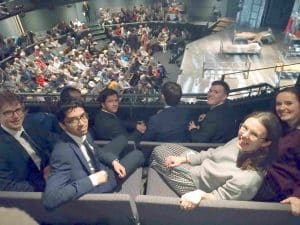 The group of Year 12 and Year 13 German students took the train to Kingston to watch The Caucasian Chalk Circle (Der kaukasische Kreidekreis) in the town’s Rose Theatre.
The group of Year 12 and Year 13 German students took the train to Kingston to watch The Caucasian Chalk Circle (Der kaukasische Kreidekreis) in the town’s Rose Theatre.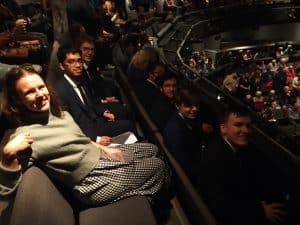 The visit reinforced the boys’ Sixth Form German studies. The Sixth Form course covers Berlin and its cultural scene. Brecht lived and worked in East Berlin for a large part of his career, although The Caucasian Chalk Circle was written in the United States, where Brecht was living in exile during the war.
The visit reinforced the boys’ Sixth Form German studies. The Sixth Form course covers Berlin and its cultural scene. Brecht lived and worked in East Berlin for a large part of his career, although The Caucasian Chalk Circle was written in the United States, where Brecht was living in exile during the war.